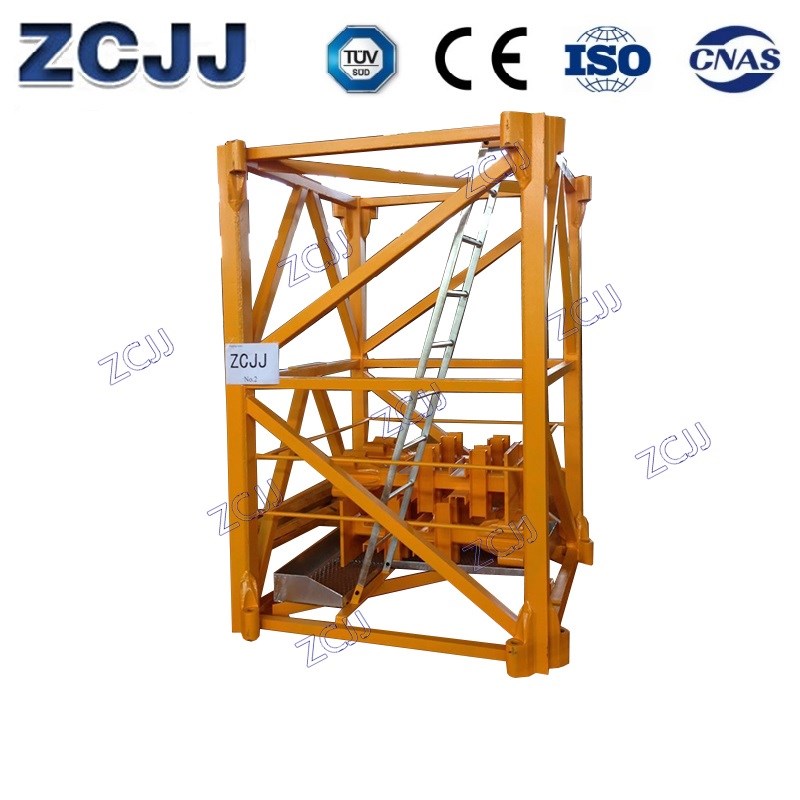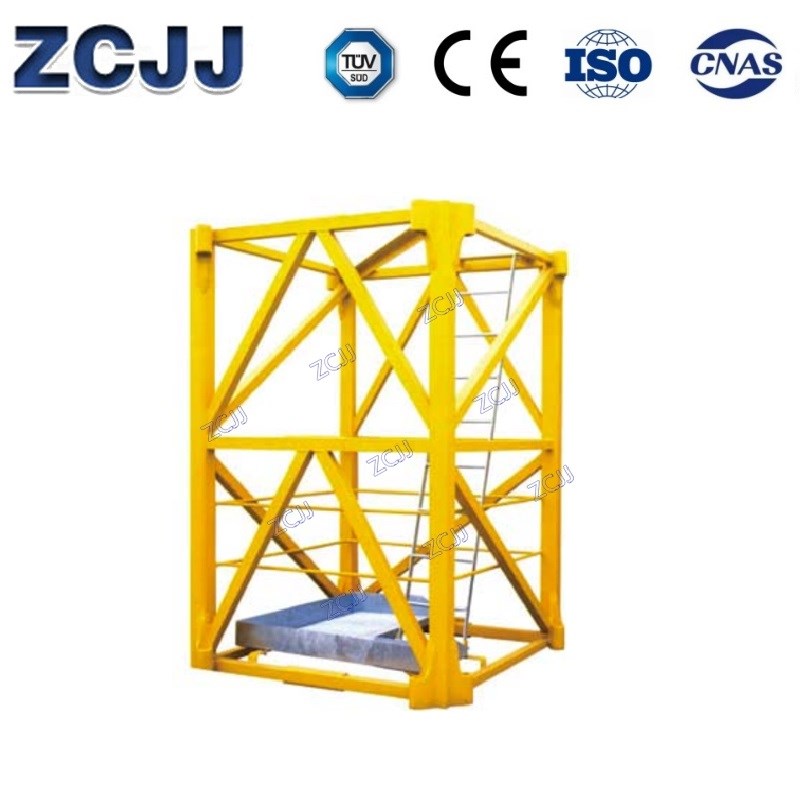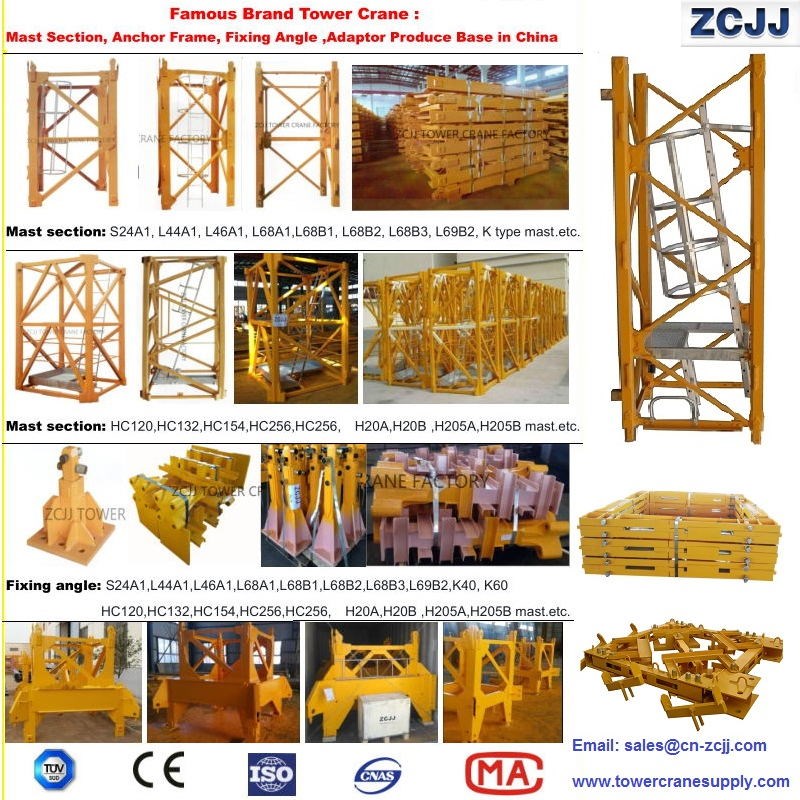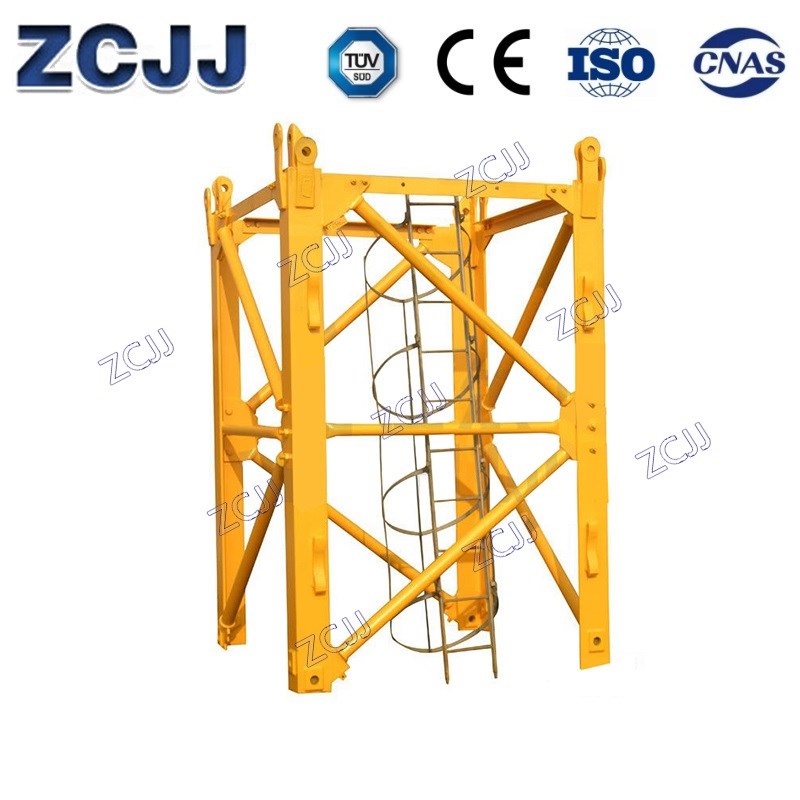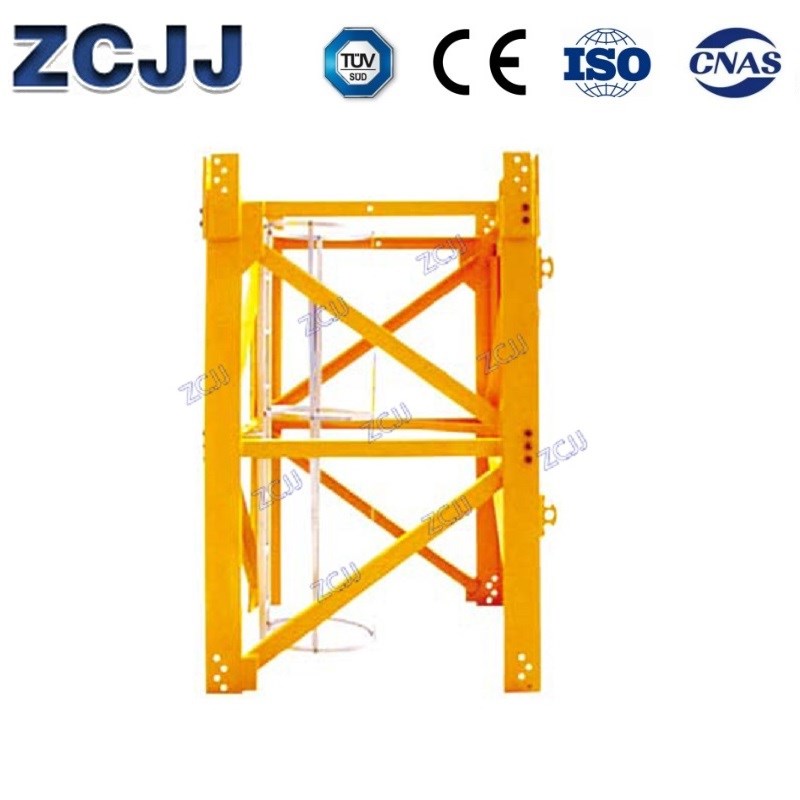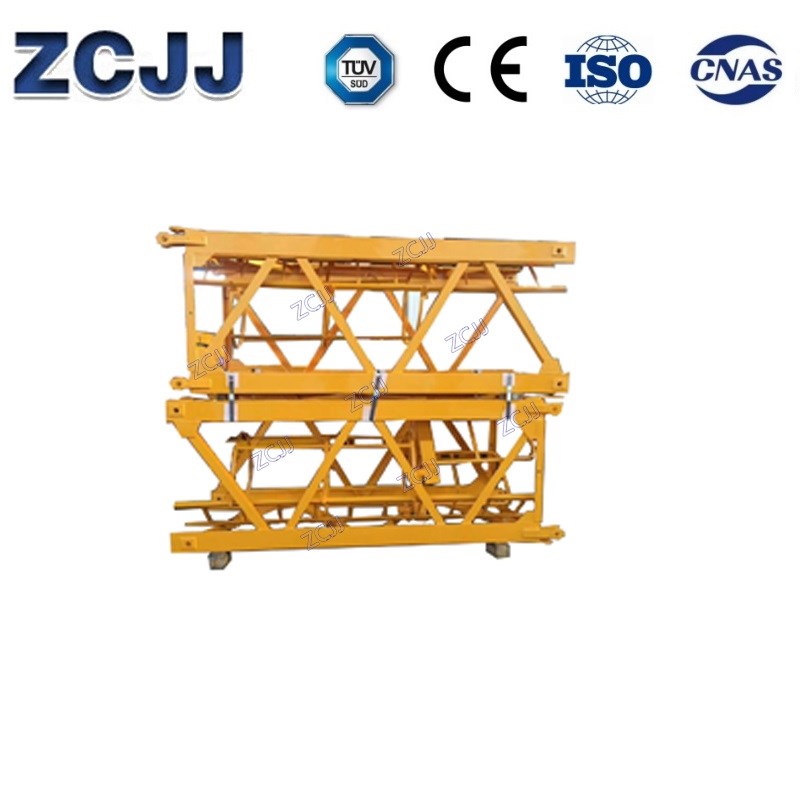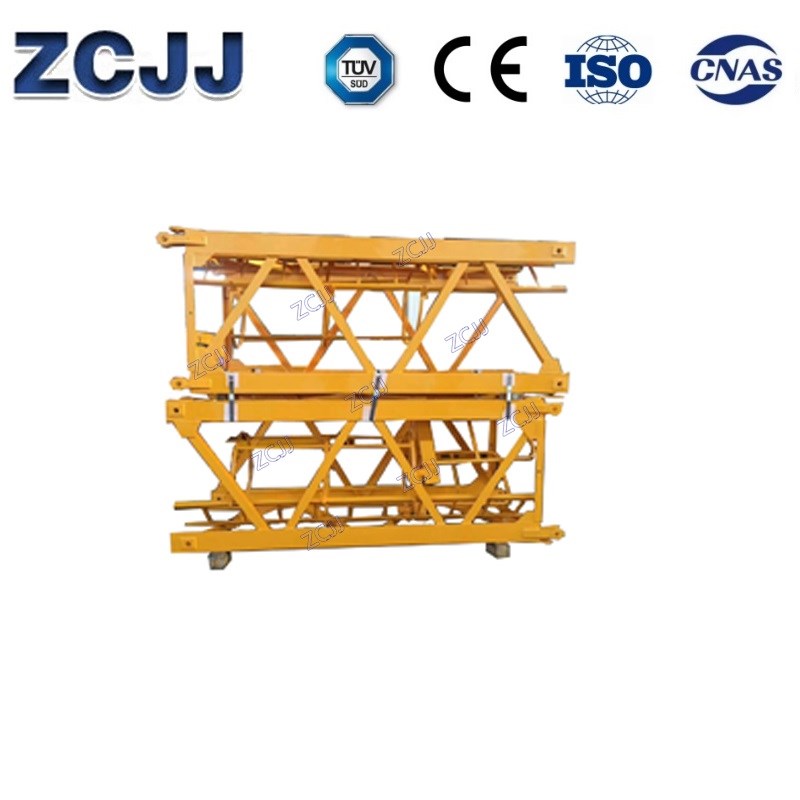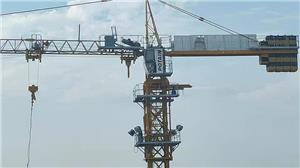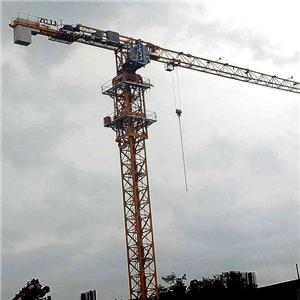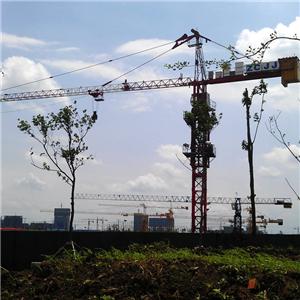154HC Mast Section Liebherr Tower Crane

- ZCJJ
- China
- 10days
- 50sets
202EC-B10 LITRONIC Mast section
250EC-B12 LITRONIC Mast section
285EC-B12 LITRONIC Mast section
Products Specification
Type , Model: 154HC Mast Section Liebherr Tower Crane
Size: 1.8mx1.8mx2.5m
Use for : Liebherr Tower Crane (132HC , 154HC)
Materials: Q345B
Within bolts, Ladder, Platform
Process: Blasting derusting,
Painting: Under painting , Middle painting, Surface painting.
Our factory produce and supply almost all famous brand tower crane :Mast section, Anchor Frame, Fixing angle ,Adaptor and so on as good quality and price.
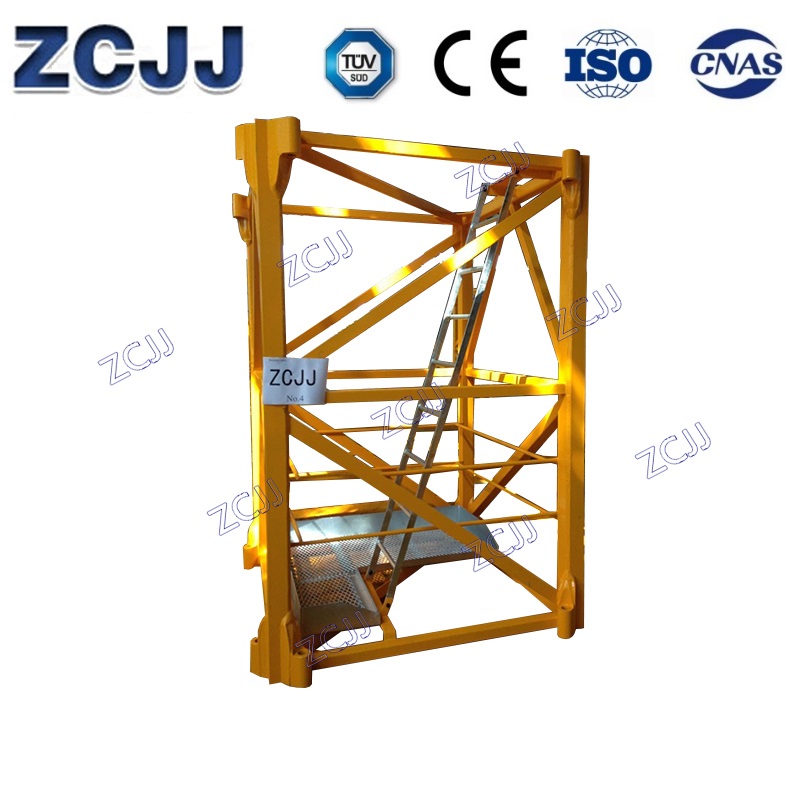
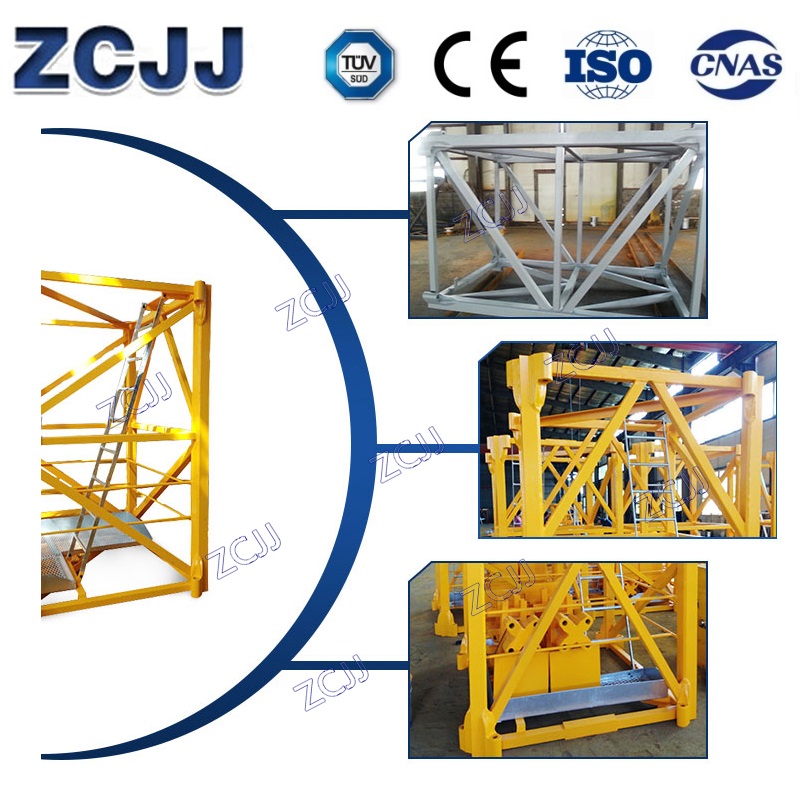
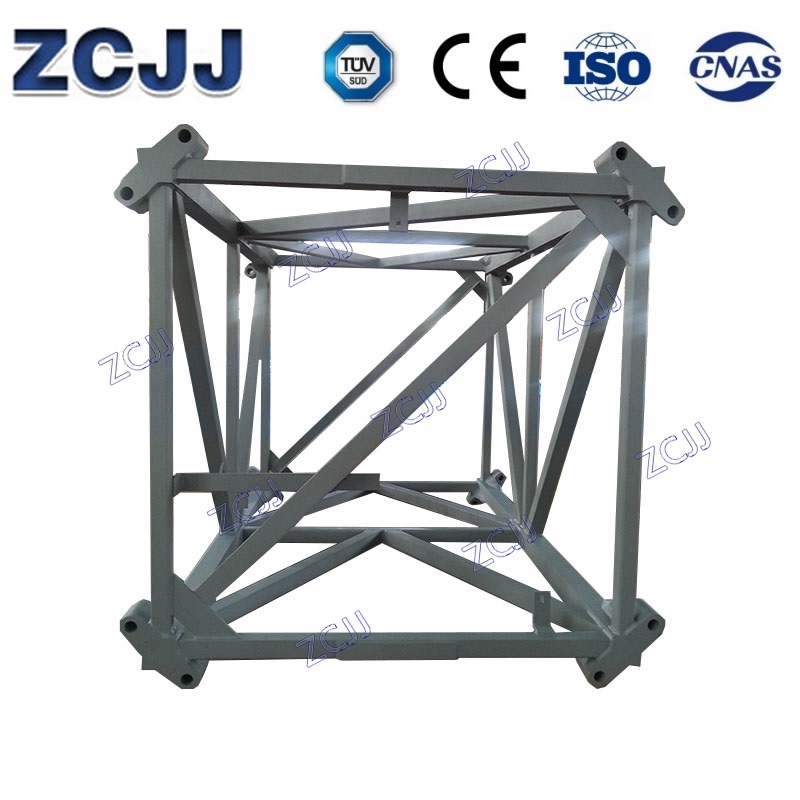
154HC Mast Section Liebherr Tower Crane
Tower Crane Knowledge sharing:
Tower crane hoisting scheme for working environment, safe operation and multi-tower operation
6. In case of gale-force 6 or above, heavy rain, heavy snow, fog and other bad weather, the tower crane shall stop working in the open air.
7. The amplitude indicator, torque limiter and various travel limit switches and other protective devices of the tower crane must be complete, sensitive and reliable. Do not adjust or dismantle it at will. It is forbidden to replace the operating mechanism with limit device.
8. During tower crane operation, no one shall stay or pass under the weight. It is forbidden to carry people by tower crane.
9. Tower crane machinery must be operated in accordance with the specified hoisting performance. Items with excessive load and unknown weight are not allowed. Under special circumstances.
when overloading is needed, there must be technical measures to ensure safety. Only with the approval of the technical person in charge of the enterprise and under the supervision of a special person, can the crane be lifted.
10. Tower cranes are strictly prohibited to be used for cable-stayed, inclined and lifted heavy objects buried underground or congealed on the ground. The concrete components or formwork cast on site must be all loose before lifting.
154HC Mast Section Liebherr Tower Crane
11. When lifting heavy objects, tie them firmly and firmly. Do not pile or hang any odd objects on the heavy objects. Loose materials and articles must be tied firmly with the cage or wire rope before lifting. Objects marked with the lashing position or mark shall be lapped according to the indicated position. Binding wire rope and shall not be less than 30 ° Angle of the object.
12, tower crane in rain and snow weather operations, should first pass the test, confirm that the brake, sensitive device is reliable before the operation.
When hoisting load full 13, tower crane, should first will cease to ascend the weight lifting off the ground at 20 to 50 ㎝ check the stability of the tower crane balance of performance, the reliability of the brake, weights, binding firmly. Confirm and then upgrade. For heavy objects that may wobble, a pull rope must be fastened.
14. The lifting or landing speed of heavy objects should be even, and sudden fast, slow and sudden braking are strictly prohibited. Turn left and right smoothly. No turning motion shall be made until the turning has stopped.
15. Tower cranes shall not operate close to overhead transmission lines. If limited to site conditions, safety protection measures shall be taken when operating near the lines.
The safe distance between tower cranes and overhead transmission wires shall not be less than that specified in the following table: transmission wire voltage: 1-15kv, 20-40kv, 60-110kv, 220KV
16. The steel wire rope used for tower crane shall be based on the technical certificate issued by the manufacturer. If no documents, should pass the test before use.
17. The structural type, specification and strength of the steel wire rope used for tower crane must meet the requirements of this type of tower crane. The wire rope shall be fixed firmly and arranged neatly.
154HC Mast Section Liebherr Tower Crane
When the wire rope is released, at least 3 circles of the reel shall be retained. Prevent the steel wire rope from looping, kinking, bending and disordered.
18. The length of the braiding part of the steel wire rope shall not be less than 15 times of the diameter of the steel wire rope when it is used for braiding. And shall not be less than 300 ㎜, its knitting part should tie wire.
The number shall not be less than 3 when rope clamping is adopted. Rope card specification, quantity should be matching with the diameter of the wire rope
19. Before each shift, all visible parts of the wire rope and connection parts of the wire rope shall be inspected. When the diameter of the wire rope is reduced by 7%, or the number of broken wires within the specified length reaches the following table, it shall be replaced.
1) cracks on the surface
2) permanent deformation of dangerous section and hook neck
3) wear of the section at the rope hanging place exceeds 10% of the height
4) hook bushing wear is more than 50% of the original thickness, spindle (pin) wear more than 3% of their diameter 21, tower crane brake brake wear raised up to 1.5-2.0 ㎜, small or the brake wear more than 50% of the original thickness shall be changed.
154HC Mast Section Liebherr Tower Crane
Vi. Safety precautions during operation:
1. When operating each controller, it shall operate successively step by step, and overstep operation is strictly prohibited. When changing the direction of operation, the controller should be turned to zero.
When the motor stops running, it will turn in the other direction. Strive for smooth operation. Quick start and quick stop are strictly prohibited.
2. lifting hook close to the top of the arm, the car line to the endpoint, should slow down to stop position. The hook distance from the top of boom shall not be less than 1 m.
3. boom type tower crane lifting, turning, walking three kinds of action can be carried out at the same time. But the amplitude change can only be carried out separately.
After each amplification, the amplification site shall be inspected. No variation is allowed when the load is full or close to full load.
4. Free fall is strictly prohibited after lifting the heavy object. When the heavy object is in position, a micromotion mechanism or a brake can be used to slowly lower the weight.
5. When the lifting weight is translated, it shall be more than 0.5m higher than the obstacles it crosses.
6. During multi-tower crane operation, the distance between the crane and any adjacent parts shall not be less than 5m (including lifting weights).
Vii. Safety precautions after operation:
1. After operation, the boom shall be turned downwind and the slewing brake shall be loosened. The trolley and the balance weight shall be moved to the non-working position. Lift the hook to 2-3m from the top of the boom.
2. Set each control switch to zero, disconnect each switch in turn, and close doors and Windows of the operation room. Turn off the main power switch after disconnecting. Turn on the altitude indicator.
3. The vertical degree of the tower should be checked frequently and adjusted timely with the theodolite.
154HC Mast Section Liebherr Tower Crane
8. Tower crane operation
1. Lifting is not allowed if the weight of the lifted object exceeds the allowable range of mechanical properties;
2. Unclear signal is not allowed to hang;
3. No one standing under the object is allowed to hang;
4. No one standing on the object is allowed to hang;
5, buried in the ground is not allowed to hang;
6. Slanting objects are not allowed to be hung;
7, loose binding is not allowed to hang;
8. No lifting for scattered objects without containers;
9. The weight of the lifting object is unknown, the sling is not in accordance with the regulations, and the vertical members and large horizontal plate are not allowed to be lifted without clamping ring;
10. No hanging is allowed on strong winds above grade 6 and foggy days that affect vision and heavy rain and snow.
This project adopts 7 tower cranes. When multiple tower cranes are operating at the same time, they shall strictly comply with the code for simultaneous operation of multiple tower cranes
The boom height within the swing radius of tower crane should be staggered according to the actual situation to prevent the collision between arms. Operators and commanders must pay attention to prevent tower cranes from colliding with each other to ensure safe construction.
L1-24 Mast section
13HM.1 Mast section
22HM.1 Mast section
34K Mast section
42K.1 Mast section
53K Mast section
65K.1 Mast section
81K.1 Mast section
120K.1 Mast section
MK88 Mast section
MK140 Mast section
71EC-B5FR FR TRONIC Mast section
85EC-B5 Mast section
85EC-B5 FR TRONIC Mast section
110EC-B6 Mast section
110EC-B6 FR TRONIC Mast section
130EC-B6 Mast section
130EC-B8 FR TRONIC Mast section
150EC-B6 LITRONIC Mast section
150EC-B6 FR TRONIC Mast section
150EC-B8 LITRONIC Mast section
150EC-B8 FR TRONIC Mast section
172EC-B8 LITRONIC Mast section
180HC-L8/16 LITRONIC Mast section
280HC-L12/24 LITRONIC Mast section
280HC-L16/28 LITRONIC Mast section
357HC-L12/24LITRONIC Mast section
357HC-L18/32 LITRONIC Mast section
542HC-L12/24 LITRONIC Mast section
542HC-L18/36 LITRONIC Mast section
710HC-L25/50 LITRONIC Mast section
710HC-L32/64 LITRONIC Mast section
1250HC40 Mast section
1250HC50 Mast section
2000HC60 Mast section
3150HC60 Mast section
3150HC70 Mast section
4000HC70 Mast section
4000HC80 Mast section
4000HC100 Mast section
5000HC80 Mast section
32TTR Mast section
100 LC 6 Mast section
154 EC-H 6 Litronic Mast section
180 EC-H 10 Litronic Mast section
1800 C 60 Mast section
200 HC 10 Mast section
290 HC 12 Mast section
316 EC-H 12 Mast section
316 EC-H 12 Litronic Mast section
390 HC 16 Mast section
420 EC-H 16 Mast section
630 EC-H 20 Litronic Mast section
630 EC-H 20 Litronic Mast section
850 C 20 Mast section
1000 EC-H 40 Litronic Mast section

